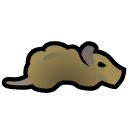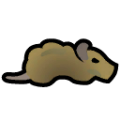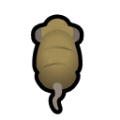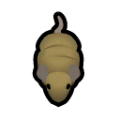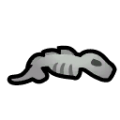Difference between revisions of "Waste rat"
m (type) |
|||
| (8 intermediate revisions by 3 users not shown) | |||
| Line 1: | Line 1: | ||
| − | {{Biotech}}{{Stub}} | + | {{Biotech}}{{Stub|reason=General, also specifically combat power}} |
| − | {{ | + | {{Infobox main|none |
| name = Waste rat | | name = Waste rat | ||
| image = WasteRat_east.png | | image = WasteRat_east.png | ||
| description = A toxin-adapted variant of the common rat. Waste rats have evolved to be pollution-resistant, as well as larger, tougher, and more aggressive than standard rats. Their bite infects their attacker with toxic buildup. | | description = A toxin-adapted variant of the common rat. Waste rats have evolved to be pollution-resistant, as well as larger, tougher, and more aggressive than standard rats. Their bite infects their attacker with toxic buildup. | ||
| type = Animal | | type = Animal | ||
| + | | type2 = Pollution | ||
| movespeed = 4.0 | | movespeed = 4.0 | ||
| flammability = 0.7 | | flammability = 0.7 | ||
| marketvalue = 35 | | marketvalue = 35 | ||
| − | | min comfortable temperature = - | + | | min comfortable temperature = -40 |
| max comfortable temperature = 40 | | max comfortable temperature = 40 | ||
| bodysize = 0.3 | | bodysize = 0.3 | ||
| − | | | + | | filth rate = 2 <!-- Not necessary for most animals unless manually set by the .xml as it is here --> |
| − | |||
| − | |||
| healthscale = 0.29 | | healthscale = 0.29 | ||
| hungerrate = 0.1 | | hungerrate = 0.1 | ||
| Line 22: | Line 21: | ||
| manhuntertame = 0.2 | | manhuntertame = 0.2 | ||
| manhunter = 0.5 | | manhunter = 0.5 | ||
| − | | trainable = | + | | min handling skill = 5 <!-- Not necessary for most animals unless manually set by the .xml as it is here --> |
| + | | trainable = intermediate | ||
| gestation = 5.661 | | gestation = 5.661 | ||
| offspring = 1-3 | | offspring = 1-3 | ||
| Line 60: | Line 60: | ||
== Analysis == | == Analysis == | ||
| − | On heavily polluted maps, waste rats may be a more reliable source of food thanks to their environmental toxic immunity, so long as your colonists are careful; much like cobras, attacks from waste rats can poison your colonists with toxic buildup. | + | On heavily polluted maps, waste rats may be a more reliable source of food thanks to their environmental toxic immunity, so long as your colonists are careful; much like cobras, attacks from waste rats can poison your colonists with toxic buildup. As a tamed animal, Waste rats reproduce incredibly fast and can be trained to attack, allowing a swarm to form. however this is not without fault, due to their toxic buildup they can be prone to causing corpses to rot, leading to the leather and meat being wasted and posing a [[Lung rot]] risk for any pawn cleaning up after, their small size also makes them quite fragile as well. Essentially serving a role as cannon fodder with less maintenance and more control compared to their non-wasted variants that have higher wildness. |
== Training == | == Training == | ||
| Line 66: | Line 66: | ||
== Health == | == Health == | ||
| − | + | {{Animal Health Table|QuadrupedAnimalWithPaws}} | |
| − | {{Animal Health Table}} | ||
== Gallery == | == Gallery == | ||
| Line 80: | Line 79: | ||
* [[Biotech DLC]] Release - Added. | * [[Biotech DLC]] Release - Added. | ||
| − | {{ | + | {{Nav|animal}} |
[[Category:Animals]] | [[Category:Animals]] | ||
[[Category:Wild animal]] | [[Category:Wild animal]] | ||
Latest revision as of 22:43, 20 September 2024
| This article relates to content added by Biotech (DLC). Please note that it will not be present without the DLC enabled. |
| This article is a stub. You can help RimWorld Wiki by expanding it. Reason: General, also specifically combat power. |
Waste rat
A toxin-adapted variant of the common rat. Waste rats have evolved to be pollution-resistant, as well as larger, tougher, and more aggressive than standard rats. Their bite infects their attacker with toxic buildup.
Base Stats
Pawn Stats
- Move Speed
- 4.0 c/s
- Health Scale
- 29% HP
- Body Size
- 0.3
- Mass - Baby
- 3.6 kg
- Mass - Juvenile
- 9 kg
- Mass - Adult
- 18 kg
- Carrying Capacity
- 23 kg
- Filth Rate
- 2
- Hunger Rate
- 0.16 Nutrition/Day
- Diet
- omnivorous grazer
- Life Expectancy
- 8 years
- Manhunter Chance
- 50%
- Manhunter Chance (Taming)
- 20%
- Trainable Intelligence
- Intermediate
- Wildness
- 50%
- Minimum Handling Skill
- 5
- Mate Interval
- 8 hours
- Maturity Age
- 0.222 years (13.3 days)
- Juvenile Age
- 0.1 years (6 days)
- Comfortable Temp Range
- -40 °C – 40 °C (-40 °F – 104 °F)
Production
- Meat Yield
- 42
 waste rat meat
waste rat meat - Leather Yield
- 19
 lightleather
lightleather - Gestation Period
- 5.661 days
- Offspring Per Birth
- 1-3 (1.614 avg)
Melee Combat
- Attack 1
- Front left paw
3.6 dmg (Scratch)
5 % AP
1.5 second cooldown
0.8 chance factor - Attack 2
- Front right paw
3.6 dmg (Scratch)
5 % AP
1.5 second cooldown
0.8 chance factor - Attack 3
- Teeth
6 dmg (Toxic bite)
9 % AP
2 second cooldown - Attack 4
- Head
2 dmg (Blunt)
3 % AP
2 second cooldown
0.2 chance factor - Average DPS
- 1.36
- tradeTags
- AnimalCommon
A waste rat is an animal added by the Biotech DLC.
Summary[edit]
Waste rats are rodents that are able to spawn on polluted maps that are considered moderately polluted or more. Unlike normal rats, waste rats have a rather high 50% revenge chance as well as a 20% chance to revenge when a handler fails to tame them. Bites from waste rats are capable of inflicting toxic buildup at a rate of 1.5% per damage inflicted.
Waste rats have 100% Toxic Environment Resistance rendering them immune to environmental effects such as rot stink and toxic buildup from non-attack sources.
Analysis[edit]
On heavily polluted maps, waste rats may be a more reliable source of food thanks to their environmental toxic immunity, so long as your colonists are careful; much like cobras, attacks from waste rats can poison your colonists with toxic buildup. As a tamed animal, Waste rats reproduce incredibly fast and can be trained to attack, allowing a swarm to form. however this is not without fault, due to their toxic buildup they can be prone to causing corpses to rot, leading to the leather and meat being wasted and posing a Lung rot risk for any pawn cleaning up after, their small size also makes them quite fragile as well. Essentially serving a role as cannon fodder with less maintenance and more control compared to their non-wasted variants that have higher wildness.
Training[edit]
This animal can be trained as follows:
| Guard: | |
|---|---|
| Attack: | |
| Rescue: | |
| Haul: | |
*As of version 1.1.2610, all animals can be tamed. The percentage of likelihood of success depends on factors such as the Animals Wildness Percentage, Pawn Handling Skill, and others. More information can be found on the animals page.
Health[edit]
| Part Name | Health | Quantity | Coverage[1] | Target Chance[2] | Subpart of | Internal | Capacity[3] | Effect if Destroyed/Removed |
|---|---|---|---|---|---|---|---|---|
| Body | 11.6 | 1 | 100% | 26% | N/A[4] | - | Death | |
| Spine | 7.25 | 1 | 3% | 3.0% | Body | Moving |
−100% Moving[5] | |
| Stomach | 5.8 | 1 | 3% | 3.0% | Body | Digestion |
−50% Digestion | |
| Heart | 4.35 | 1 | 3% | 3.0% | Body | Blood Pumping |
Death | |
| Lung | 4.35 | 2 | 3% | 3.0% | Body | Breathing |
−50% Breathing. Death if both lost | |
| Kidney | 4.35 | 2 | 3% | 3.0% | Body | Blood Filtration | −50% Blood Filtration. Death if both lost | |
| Liver | 5.8 | 1 | 3% | 3.0% | Body | Digestion |
Death | |
| Neck | 7.25 | 1 | 22% | 22% | Body | Eating Talking Breathing |
Death | |
| Head | 7.25 | 1 | 75% | 9.9% | Neck | - | Death | |
| Skull | 7.25 | 1 | 25% | 1.2375% | Head | - | Cannot be destroyed Increasing Pain based on damage. | |
| Brain | 2.9 | 1 | 70% | 2.8875% | Skull | Consciousness |
Death Damage always results in scarring. | |
| Eye | 2.9 | 2 | 12% | 0.495% | Head | Sight |
−25% Sight. −100% if both lost. Damage always results in scarring. 0% Hit Chance against Blunt damage. | |
| Ear | 3.48 | 2 | 8% | 0.33% | Head | Hearing |
−25% Hearing. −100% if both lost. −15 Disfigured Social penalty | |
| Nose | 2.9 | 1 | 10% | 0.4125% | Head | - | −15 Disfigured Social penalty | |
| AnimalJaw | 2.9 | 1 | 10% | 0.4125% | Head | Manipulation |
−100% Manipulation. Can no longer use Bite attack. | |
| Front Leg | 8.7 | 2 | 7% | 5.95% | Body | Moving |
−25% Moving. −50% if both lost. Can no longer use paw attack[6] | |
| Front Paw | 2.9 | 2 | 15% | 1.05% | Front Leg | Moving |
−25% Moving. −50% if both lost. | |
| Rear Leg | 8.7 | 2 | 7% | 5.95% | Body | Moving |
−25% Moving. −50% if both lost | |
| Rear Paw | 2.9 | 2 | 15% | 1.05% | Rear Leg | Moving |
−25% Moving. −50% if both lost |
- ↑ Coverage determines the chance to hit this body part. It refers to the percentage of the super-part that this part covers, before its own sub-parts claim their own percentage. For example, if the base coverage of the super-part is 100%, and the coverage of the part is 20%, 20% of hits would hit the part, and 80% the super-part. If the part had its own sub-part with 50% coverage, the chances would be 10% sub-part, 10% part, 80% super part.
- ↑ Target Chance is the actual chance for each part to be be selected as the target when each part's coverage has been taken into account(I.E. Neck covers 7.5% of Torso but Head covers 80% of Neck so it actually has only a 1.5% chance to be selected). This is not pure hit chance, as different damage types propagate damage in different ways. See that page for details.
- ↑ Note that capacities can affect other capacities in turn. Only the primary effect is listed. See specific pages for details.
- ↑ This is the part that everything else connects to to be considered 'connected'.
- ↑ If Moving drops below 16% a pawn cannot move.
- ↑ A Scratch attack that varies from animal to animal. Each front paw allows one attack.
Gallery[edit]
Version history[edit]
- Biotech DLC Release - Added.
